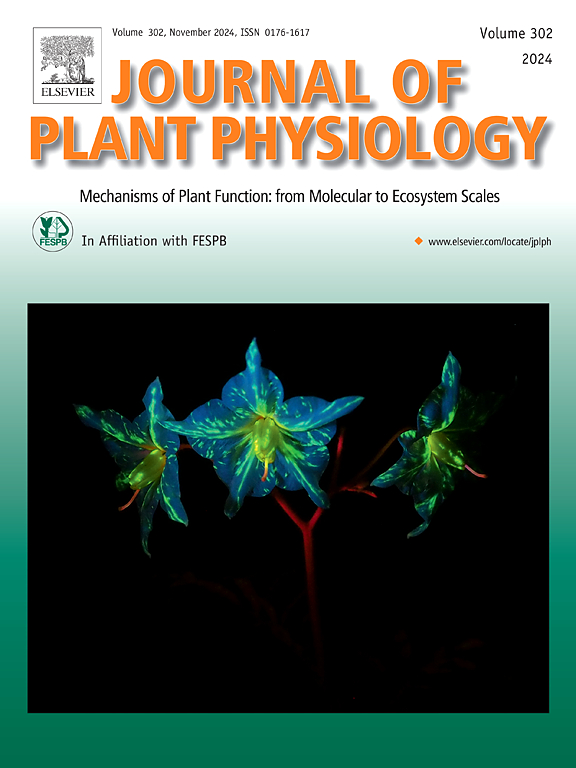Optimizing Plant Alkaloid Biosynthesis under Drought Stress: Regulatory Mechanisms and Biotechnological Strategies
IF 4.1
3区 生物学
Q1 PLANT SCIENCES
引用次数: 0
Abstract
Global climate change exacerbates drought stress, severely affecting plant growth, agricultural productivity, and the biosynthesis of secondary metabolites. Alkaloids, nitrogenous compounds with diverse biological activities, hold substantial medicinal value across various plant species. This review investigates the regulatory mechanisms through which drought stress influences alkaloid synthesis, focusing on key pathways such as abscisic acid (ABA) signaling and reactive oxygen species (ROS) responses that modulate gene expression and metabolic processes. Furthermore, we explore advanced biotechnological strategies—including genetic engineering, synthetic biology, and artificial intelligence (AI)—designed to optimizing alkaloid production under drought stress conditions. In agriculture, these strategies support the development of drought-resistant crops with enhanced alkaloid profiles, while in the pharmaceutical industry, sustainable production methods for valuable alkaloids are highlighted. The review also addresses critical challenges, such as balancing plant growth with metabolite production and ensuring field-level applicability of laboratory-developed strategies. By emphasizing interdisciplinary collaboration, this research provides comprehensive insights and practical guidance for enhancing crop resilience and maximizing alkaloid yields, thereby advancing sustainability in the medicinal plant industry.

干旱胁迫下植物生物碱合成优化:调控机制与生物技术策略
全球气候变化加剧了干旱胁迫,严重影响了植物生长、农业生产力和次生代谢物的生物合成。生物碱是一种具有多种生物活性的含氮化合物,在多种植物中具有重要的药用价值。本文综述了干旱胁迫影响生物碱合成的调控机制,重点研究了调控基因表达和代谢过程的脱落酸(ABA)信号和活性氧(ROS)反应等关键途径。此外,我们探索了先进的生物技术策略,包括基因工程、合成生物学和人工智能(AI),旨在优化干旱胁迫条件下的生物碱生产。在农业方面,这些战略支持开发具有增强生物碱特性的抗旱作物,而在制药业,强调有价值生物碱的可持续生产方法。该综述还解决了一些关键挑战,例如平衡植物生长与代谢物生产,以及确保实验室开发的策略在实地层面的适用性。通过强调跨学科合作,本研究为提高作物抗逆性和最大化生物碱产量提供了全面的见解和实践指导,从而促进药用植物产业的可持续性。
本文章由计算机程序翻译,如有差异,请以英文原文为准。
求助全文
约1分钟内获得全文
求助全文
来源期刊

Journal of plant physiology
生物-植物科学
CiteScore
7.20
自引率
4.70%
发文量
196
审稿时长
32 days
期刊介绍:
The Journal of Plant Physiology is a broad-spectrum journal that welcomes high-quality submissions in all major areas of plant physiology, including plant biochemistry, functional biotechnology, computational and synthetic plant biology, growth and development, photosynthesis and respiration, transport and translocation, plant-microbe interactions, biotic and abiotic stress. Studies are welcome at all levels of integration ranging from molecules and cells to organisms and their environments and are expected to use state-of-the-art methodologies. Pure gene expression studies are not within the focus of our journal. To be considered for publication, papers must significantly contribute to the mechanistic understanding of physiological processes, and not be merely descriptive, or confirmatory of previous results. We encourage the submission of papers that explore the physiology of non-model as well as accepted model species and those that bridge basic and applied research. For instance, studies on agricultural plants that show new physiological mechanisms to improve agricultural efficiency are welcome. Studies performed under uncontrolled situations (e.g. field conditions) not providing mechanistic insight will not be considered for publication.
The Journal of Plant Physiology publishes several types of articles: Original Research Articles, Reviews, Perspectives Articles, and Short Communications. Reviews and Perspectives will be solicited by the Editors; unsolicited reviews are also welcome but only from authors with a strong track record in the field of the review. Original research papers comprise the majority of published contributions.
 求助内容:
求助内容: 应助结果提醒方式:
应助结果提醒方式:


